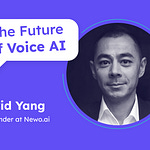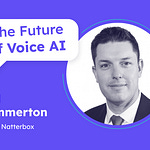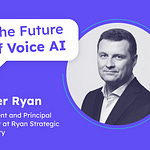In the Future of Voice AI series of interviews, I ask three questions to my guests:
- What problems do you currently see in Enterprise Voice AI?
- How does your company solve these problems?
- What solutions do you envision in the next 5 years?This episode’s guest is Brandon Hawkins, Conversational AI Product Lead at Twilio.
Brandon Hawkins is the Product Lead for Conversational AI at Twilio, focusing on advancing voice AI to handle complex and natural conversations. He works on solutions that help businesses orchestrate media, enhance automation, and improve customer experiences. Brandon emphasizes trust and compliance, ensuring reliable communication at scale while addressing challenges like sentiment analysis and security. He is involved in evolving Twilio's platform to support multi-modal AI interactions, balancing cutting-edge innovations with practical customer needs and scalable solutions.
Today's leading companies trust Twilio's Customer Engagement Platform (CEP) to build direct, personalized relationships with their customers everywhere in the world. Twilio enables companies to use communications and data to add intelligence and security to every step of the customer journey, from sales to marketing to growth, customer service and many more engagement use cases in a flexible, programmatic way. Across 180 countries, millions of developers and hundreds of thousands of businesses use Twilio to create magical experiences for their customers.
Recap Video
Takeaways
Twilio aims to democratize AI development, making it accessible to businesses of all sizes.
AI tools should be flexible, like building blocks - Twilio’s products are like "Lego pieces," letting businesses customize solutions to fit their needs without starting from scratch.
Twilio’s platform connects different technologies while helping developers and businesses work better as customer needs change.
Businesses need instant data on calls to improve service quality, ensure compliance, and fine-tune operations.
Managing real-time sentiment analysis in live conversations is a key challenge.
Twilio is making AI more accessible by simplifying interfaces for non-experts.
Trust is key in AI-powered communication, especially as AI becomes harder to distinguish from humans.
The future of voice AI lies in creating more personalized and context-aware interactions.
Speech-to-speech tech is the next big thing – it will be super fast and simplify how we communicate with AI.
The future of AI is multi-modal, combining voice, text, and other inputs to create a smooth, connected experience across different platforms.
Twilio is stepping up efforts in telemetry and AI to monitor call quality, automate tasks, and improve agent performance.
Twilio AI Assistants launched in response to high demand for an out-of-the-box AI agent-building platform born from an internal hackathon project.
Sneak peak: Twilio AI Assistants is set to introduce voice capabilities, opening new possibilities for AI-driven communication this month.











